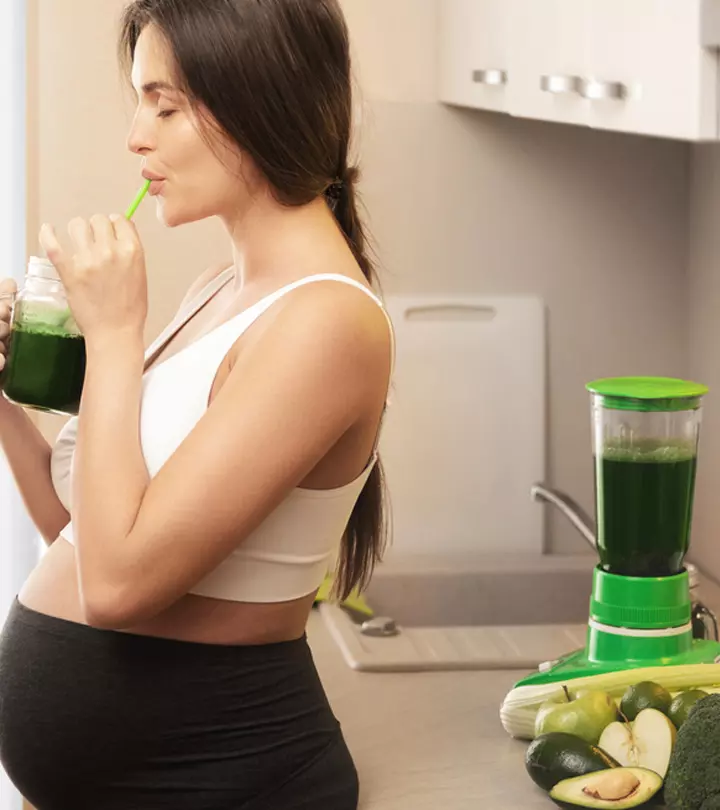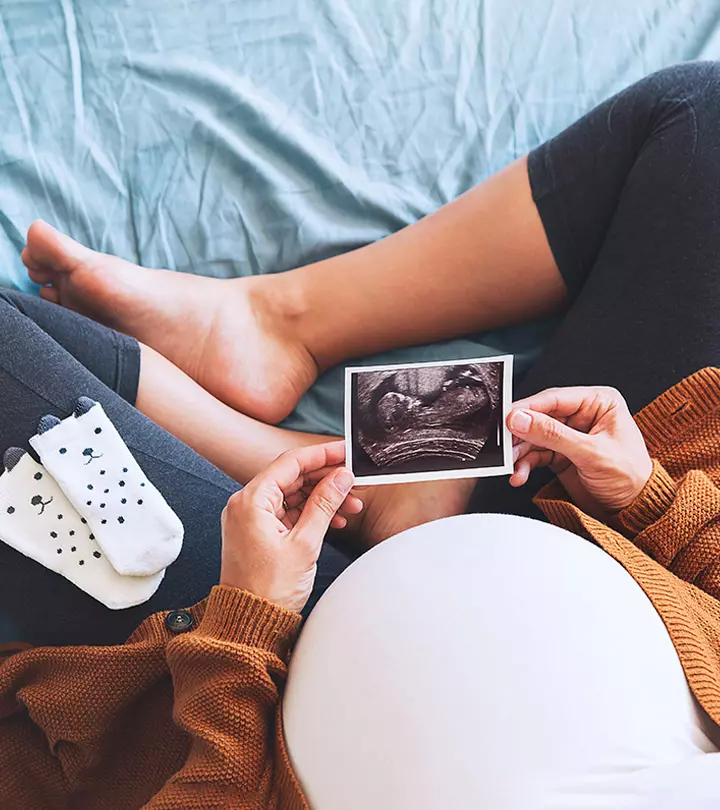
Image: Shutterstock
Pregnancy is a time for self-care and proper rest in the comforts of your home. However, sitting around indoors all the time can get quite boring and tiring at the same time. During pregnancy, it’s not very convenient to plan activities like travel or adventure; which often leaves you without too many choices other than being a couch potato. But that’s no reason to not enjoy the outdoors and catch some sunlight every once in a while. A day by the beach or even by the pool on a warm sunny day can feel so good for your body and mind. The sun’s rays will nourish you with some much-needed vitamin D, which is very important for your health (1). Unfortunately, direct sunlight is also associated with many skin problems like tans, burns, dryness, and in some cases even skin cancer. So, it’s indeed important to exercise caution when you’re soaking in the sun. In this article, we will answer some of the pertinent questions that would-be-mothers might have when it comes to enjoying the sunny outdoors:

Are You More Susceptible To Sunburn When Pregnant?

Image: Shutterstock
The answer is yes; you are more susceptible to sunburn when you are pregnant. Pregnant women are vulnerable to several things, thanks to the hormones at play. An increase in the levels of hormones in your body essentially makes your skin more sensitive. The UV rays of the sun can penetrate the skin more quickly during this time. Pregnant women often complain of getting skin burns faster when under the sun, as opposed to their non-pregnant counterparts. Furthermore, studies also suggest that pregnant women are at a higher risk of developing skin cancer (2), (3).
On one hand, your hormones are extremely vital in the overall development of both mother and child. But on the other hand, these hormones can also target the pigment-producing cells in your skin and send them into overdrive. So, you can end up with lifelong damage caused by the sun, such as melasma. Melasma is a medical condition where you get brown or black patches across your face and neck and is usually permanent (4).
How Do You Prevent A Sunburn?

Image: Shutterstock
To prevent sunburn, you will have to undertake the same precautions as you would before your pregnancy. Invest in a good sunscreen with an SPF of 40 and above. While choosing your sunscreen, opt for ones that are generally considered safe for pregnant women; you can do this by consulting the pharmacist or your healthcare provider. Avoid sunscreens that contain oxybenzone. These can negatively affect your baby as it gets absorbed into your bloodstream. You can instead opt for sunscreens with titanium dioxide and zinc oxide, which don’t get absorbed as easily (5).
Try to stay indoors between ten in the morning and four in the evening, as during this period, the sun’s UV rays are at their strongest. Ensure you wear clothing that covers you adequately and is loose enough to allow the skin to breathe. Hats aren’t just cute; they can be a lifesaver as well, so invest in a good hat if you plan to hit the beach. Make sure you drink plenty of water to keep yourself hydrated and look for a place that has shade, so you aren’t completely exposed to the sun.
How To Heal A Sunburn?

Image: Shutterstock
Sometimes, no matter what safety precautions you take, you can still end up with sunburn, so how do you heal this? A cool shower can help relieve the inflammation associated with sunburn. Over-the-counter medications and topical applications to treat sunburn are available, but you will have to check with your doctor to ensure it is safe for pregnant women.
If you want to take the more natural route, apply some aloe vera gel to your body. It has a cooling effect as well as anti-inflammatory properties (6). Wear clothes that are loose and comfortable, instead of heavy clothing or ones that stick to the skin.
Will My Baby Get Affected?

Image: Shutterstock
In case you get a sunburn, there are chances that it may affect your unborn baby, but it is very rare. For example, you can get severely dehydrated, which in turn can dehydrate your baby as well. Similarly, exposure to the sun in excess can break down the folic acid present in your body. Folic acid is crucial in your child’s development; it also helps prevent congenital disabilities (7).
When Should You Be Worried?

Image: Shutterstock
A sunburn can be extremely uncomfortable but isn’t usually a cause for concern. It may take a few days to fade away, and the measures we mentioned above may help. However, if your skin has blisters and bubbles and you notice that it is draining, seek medical help immediately. Other worrying signs include dehydration, fever, inability to breathe, dizziness, decreased urination and sweating, and dryness in the mouth.
Will Avoiding Sunlight Altogether Have Any Adverse Effects?

Image: Shutterstock
Sunlight is our main source of getting vitamin D naturally. Vitamin D plays an important role in maintaining the proper growth and development of the human body. The need for Vitamin D is more crucial in expecting mothers as it regulates the calcium metabolism of the fetus, especially towards the final months of pregnancy. Vitamin D deficiency is commonly seen in pregnant women and artificial supplements are often not enough to meet the body’s requirements. This may lead to a variety of problems for both the mother and the child inside her. Preeclampsia, which is caused due to vitamin D deficiency can even be life-threatening for expecting mothers (8). As such, it’s very important for would-be mothers to get enough exposure to sunlight during the mornings and evenings.
Sunlight is great for everyone, pregnant women included. It is your natural source of Vitamin D and happiness — yes, sunlight is a mood lifter as well. However, too much of a good thing can be a bad thing, so enjoy the sun in moderation. Don’t be afraid to soak in all that golden; just take the necessary precautions and don’t overdo it. Have you experienced sunburn when pregnant before? How did you deal with it? Let us know in the comments below!
References
- Benefits of Sunlight: A Bright Spot for Human Health
https://www.ncbi.nlm.nih.gov/pmc/articles/PMC2290997/ - Ultraviolet radiation and its effects on pregnancy: A review study
https://www.ncbi.nlm.nih.gov/pmc/articles/PMC6069651/ - Sunburn as a Cause of Unexpected Neutrophilia in a Healthy Pregnant Woman
https://www.ncbi.nlm.nih.gov/pmc/articles/PMC5933047/ - Melasma: a clinical and epidemiological review*
https://www.ncbi.nlm.nih.gov/pmc/articles/PMC4155956/ - The Banned Sunscreen Ingredients and Their Impact on Human Health: A Systematic Review
https://www.ncbi.nlm.nih.gov/pmc/articles/PMC7648445/ - The efficacy of aloe vera used for burn wound healing: a systematic review
https://www.ncbi.nlm.nih.gov/books/NBK74820/ - Folate degradation due to ultraviolet radiation: possible implications for human health and nutrition
https://pubmed.ncbi.nlm.nih.gov/22747844/ - Implications of vitamin D deficiency in pregnancy and lactation
https://www.ncbi.nlm.nih.gov/pmc/articles/PMC3540805/
Community Experiences
Join the conversation and become a part of our nurturing community! Share your stories, experiences, and insights to connect with fellow parents.












